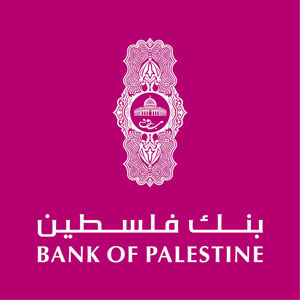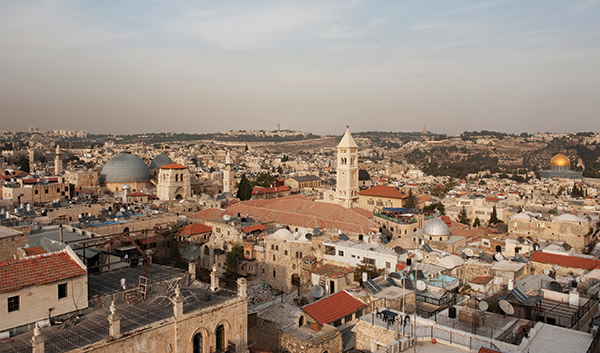
For the past fifty years, Jerusalem has been suffering from the Israeli occupation. The situation has worsened during the past few years due to the increased Israeli hold on the city and its attempt to control the city’s history, economy, culture, and society. The poverty rate in Jerusalem has increased to more than 80 percent since 1967. The tourism, industrial, commercial, and service sector conditions have worsened. The city has experienced continuous crises due to the occupation’s policies that have resulted in a commercial and economic recession, the bankruptcy of various enterprises, the closure of hundreds of commercial stores, and the migration of many economic institutions and enterprises outside the city. Prior to the Oslo Agreement in 1993, Jerusalem comprised 15 percent of the overall Palestinian economy. Today this figure has been reduced to 7 percent. According to a media report published in 2014, 75 percent of occupied East Jerusalem residents live below the poverty line.
Despite all attempts to practically erase Jerusalem from the national Palestinian map, the city is resilient. Initiatives and development projects executed by private-sector companies and civil-society institutions contribute, even if just slightly, to strengthen the city’s perseverance and continuation of life. Despite everything, Jerusalem is the eternal capital for Palestinians and a source of cultural inspiration, always shining with hope for a better life. A number of institutions from the private sector and civil society contribute to development projects that substantially relieve the suffering of citizens who live in Jerusalem. Bank of Palestine provides support to health institutions, including Augusta Victoria Hospital, Al-Makassed Hospital, Saint John’s Eye Hospital, and Bir Nabala Hospital outside the Separation Wall. At Augusta Victoria Hospital, Bank of Palestine established a playground to be used by patients in the children’s ward, especially those who have cancer. At Al-Makassed Hospital, the bank purchased mobile homes (caravans) to be used by the family members of out-of-town patients. Many patients are from Gaza, Nablus, Hebron, and other Palestinian cities, and their families are not able to find appropriate accommodations at affordable rates.
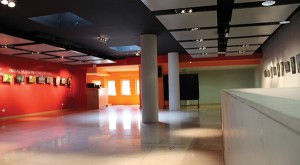
During the last quarter, the bank launched a campaign titled “Palestine in Our Heart.” The campaign’s goal was to gather financial support for the hospital and for our people in Gaza who continue to suffer in the aftermath of the last Israeli onslaught. The campaign raised around $1 million through the donations of the bank’s customers, shareholders, and investors from other institutions. The bank also provides various contributions to all Palestinian hospitals in Jerusalem to support their resilience and to aid in their facility development to continue to serve Palestinians from within and outside Jerusalem.
A number of companies and organizations in Jerusalem finance and support educational and development projects. Bank of Palestine is working on a new program, in partnership with the Welfare Association, to support youth leadership in Jerusalem schools. This is accompanied by several partnerships with various cultural institutions in Jerusalem. Bank of Palestine believes in developing and supporting the continuity of the cultural scene. In partnership with Yabous Cultural Center, the bank launched a campaign called “Immortalize Your Name in Jerusalem” in order to revive the work at the Jerusalem Cinema. The bank currently has a five-year partnership agreement with Yabous. In addition, through its partnership with the Edward Said National Conservatory of Music, the bank has contributed to reviving the spirit of art and culture in Jerusalem by sponsoring the conservatory’s performances and participation in various local and international festivals, including the sponsorship of the first national Palestinian Orchestra for Youth. In addition, the bank provides significant support to a number of important activities in Jerusalem that have a clear impact on reviving the Holy City’s spirit, economy, and tourism sector. Bank of Palestine’s activities in Jerusalem are part of a commitment that the private sector has made towards the city. One of the various initiatives to revive Jerusalem was the establishment of the Jerusalem Holding Company. The company works to increase investments in Jerusalem and enhance its economy, therefore supporting the resilience of its people.
Through another of its projects, the Palestine Development and Investment Company (PADICO Holding) renovated and reopened Saint George Hotel, a landmark of East Jerusalem. The hotel, one of the biggest and best hotels in Jerusalem, is now open for business with its newly renovated facilities.
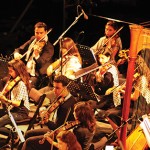
As part of its national duty towards Jerusalem and devotion to its Arab, Islamic, and Christian character, PADICO previously launched “Alhambra Palace” project, which is located on Salah al-Din Street. Formerly known as Alhambra Cinema – which has been closed for twenty years – it was revived and reopened for business with earmarked funds that exceed $2 million. Such projects highlight the importance of investing in this city that holds significant emotional, religious, and tourist value. PADICO Holding is working to implement a residential project in Beit Safafa that will develop more than 160 residential apartments and a shopping center. The company is also researching the possibility of implementing several other projects to create promising investment opportunities in Jerusalem.
Palestine Investment Fund (PIF) announced the “Jerusalem Grant Program” to support small and medium enterprises in the city. This promising project, which is managed by the PIF through funding from the European Union, is expected to vitalize the small and medium enterprises in Jerusalem. The budget earmarked for this project is €1.8 million and began in 2014, for a period of two years, to provide financing in the form of grants to projects in Jerusalem. Funded projects should show viability, sustainability, and the ability to employ people.
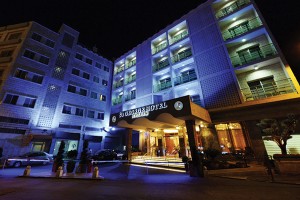
An important question remains: Is this sufficient to change the status quo in Jerusalem? Certainly not, as Jerusalem needs greater efforts that are not limited to the private sector’s heroic initiatives in revitalizing tourism, industry, education, health, and economic projects. Despite the fact that these needs are considered to be opportunities for investment for those who take initiative, Jerusalem needs collaboration among all related parties. The Palestinian Authority, Arab, Islamic, and Christian funds, the private sector, banks, and civil-society institutions must all unite to save Jerusalem. It is one of the largest cities of historical Palestine, in terms of area and population, and it is the most significant politically, economically, and culturally. It is the Holy City. Given that the city is experiencing a rapid increase in adverse practices and harassment by the Israeli occupation in an unprecedented and organized manner that aims to erase its political, cultural, and social features, everyone must cooperate to foil these plans with a strong will and full awareness. We are confident that all private-sector, governmental, international, and Islamic institutions and organizations are able to make the needed change and contribute to preserving the identity of the holy Palestinian city, the capital of our vigorous country.
References
Palestinian Central Bureau of Statistics
Bank of Palestine

